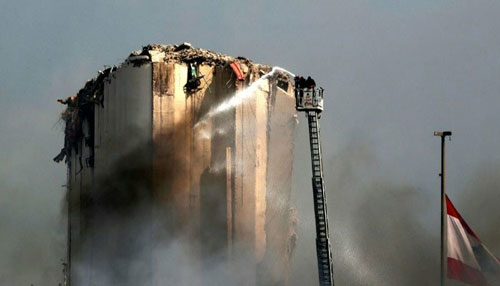Beirut
Lebanese firefighters on Friday put out a blazing Beirut port that rekindled last month’s trauma of the lethal deadly dockside explosion which destroyed badly needed food aid.
Fire crews used cranes to hose down the last smouldering embers of the fire that swept through already damaged warehouses on Thursday, AFP correspondents reported.
But popular anger at the authorities’ failure to provide public safety, even in the heart of the capital, was rekindled by the new blaze.
The fire broke out on Thursday afternoon as workers were carrying out repair work on some of the warehouses still standing after last month’s explosion.
Sparks from a power saw being used in the repairs were the likely cause of the blaze, according to the government’s preliminary findings.
The International Committee of the Red Cross said one of the warehouses contained precious food aid for tens of thousands of needy families in Lebanon and in neighbouring Syria.
It said it had been working on moving the supplies out of the damaged warehouse ever since the August 4 blast but the operation had still been ongoing when the fire hit.
“Due to the rubble present and the danger involved, it is not possible to confirm the level of loss incurred at this time,” an ICRC statement said.
“The explosion and the fire will no doubt have an impact on the ICRC’s humanitarian aid whether in Lebanon or Syria.”
On Friday, earthmovers were again at work clearing rubble from the port through which the vast majority of Lebanon’s food and other imports used to pass.
“The fire is very weak. There’s just one area we’re still dealing with. It’s nothing,” said George Abou Moussa, operations director of Lebanon’s civil defence agency.
The sight of a vast pall of smoke billowing over the port district on Thursday, barely a month after the colossal blast killed more than 190 people and ravaged tens of thousands of homes, sent terrified residents running onto the streets.
“What happened yesterday was a repetition of August 4,” said Antoine Assaad, who lives in the capital’s heavily damaged Mar Mikhael neighbourhood.
“People were terrified. They were running into each other in their hurry to escape.”
The August 4 explosion of hundreds of tonnes of ammonium nitrate fertiliser, which had been left unsupervised in a port warehouse for years, reignited anti-government protests which had died down in the face of the coronavirus pandemic.
The blast heaped new misery on Lebanese already battling the country’s worst economic crisis in decades, which has seen poverty rates double to more than half the population.
Criminology researcher Omar Nashabe asked how fire could erupt in an area that should have been a protected crime scene. “Where is the judiciary? Where is the state? Where is responsibility?” he asked. The government resigned after last month’s explosion, but President Michael Aoun remains in office alongside his new prime minister designate Moustapha Adib.
Aoun said Thursday’s fire could have been an “intentional act of sabotage, the result of a technical error, ignorance, or negligence”.—AFP










